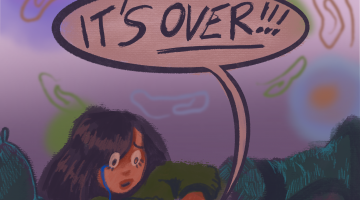
Many newspapers are at threat of financial insolvency, but their watchdog role remains important.
There’s no debate that the technological world has sent the paper into the recycling bin, but what happens when they are forgotten altogether? In an age where we can obtain news in less than ten seconds, the newspaper just isn’t keeping up with the market. However, newspapers and real journalism should not be held to the market standard for its commercial appeal—but its ability to hold people accountable.
According to an episode of NPR’s Hidden Brain podcast, “Starving the Watchdog” last December, journalism acts as a point of accountability. The host, Shankar Vedantum, states, “The watchdog role that journalists play in holding public officials and powerful corporations accountable. When a newspaper closes or slashes its reporting staff, there’s no one to play that role anymore. It’s like getting rid of the police officers who patrol neighborhoods.”
From Whistleblower to Watergate, the newspaper keeps tabs on those in charge. National news firms like the New York Times or the Wall Street Journal hold people with federal power accountable, but it is the locally owned firms that are watching your governors and city council members.
The issue that newspapers face today is that there is too much competition against them. Online is faster. TV is easier. Social media can deliver news in seconds, so what’s the point? Isn’t it all fake anyway? But the reality is newsrooms are being bought up by big money corporations with an interest in profit—not public service. Therein lies the problem that journalism encounters: Because of the interest in profit, media is now focused on grabbing readers’ attention. This leads to loss of truth and the infamous “fake news”.
Then it becomes important to distinguish the difference between news and journalism. News is a headline. News is a two minute update. Journalism presents a deeper story. Ideal journalism presents facts and an analysis of what happened. It is not what appears on a Twitter feed.
The problem with not having a physical newspaper, is that there isn’t as much reliability. Have you ever been working on an essay for three hours only to forget to save it? Ever been scrolling through Twitter when the app resets itself and the tweet you wanted to like is now buried under a hundred other posts grasping for attention? The internet is not as stable as we might think. Along with that, online news is more easily faked and is crowded around other sources with the same story. It’s too hard nowadays to obtain information because there is too much of it. Fake news can easily hide in plain sight.
Student Audrey Edmondo weighed in on this stating, “Newspapers were a happy medium in that there is more accountability on the journalists end, in that they’re almost forced to do research and investigate, and while online makes more sense economically and sustainably, print is more consistent and less biase[d].”
A journalist’s job today is to deliver information as quickly and as accurately as possible. With the rise of mainstream media and 24-hour news updates, that job is diluted from producing an accurate story to keeping the public’s attention. Because of our demand for quick access to information, stories have to be short, understandable and have a catchy headline in order to draw the reader’s attention. This leads to loss of accuracy, loss of the real facts.
With newspapers, there is time involved. Articles have more time to be investigated and reported on accurately. However, accuracy isn’t making a lot of money anymore. Truth doesn’t sell.
Supporting local news and keeping up with real journalism will have an effect in the long run. It’s the same idea of buying from a local farmer instead of from a large company, they are more reliable and you know where the product is coming from. Local newsrooms have more ethical values in delivering information and holding people liable. Support for accurate news comes from the consumer. When you feed your watchdog, you support the protection of a community from potentially harmful actions of an authoritative power.
Sarah Strang can be reached at sstrang@sagebrush.unr.edu or on Twitter @sarahstrang100.










